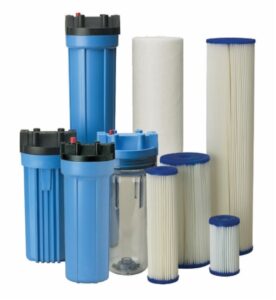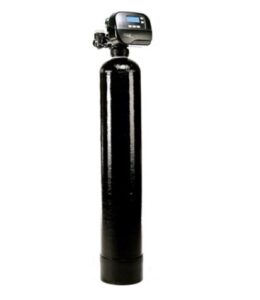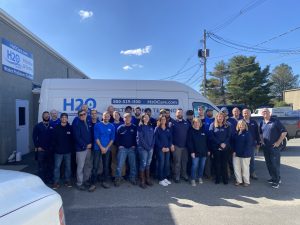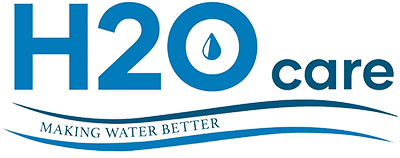
CATALYTIC ACTIVATED CARBON FILTRATION
Carbon filtration is a method of filtering that uses activated carbon to remove chemicals (such as chlorine, volatile organics and others) and some bad tastes and odors from water. With a carbon filter process, water passes through activated carbon, which is porous, trapping certain particles that are attracted to the porous material in a process known as adsorption (not absorption) At some point, adsorption capacity is exceeded and the filter must be changed in order to be effective. Coal is the most common element used to produce carbon filters, but manufacturers will often enhance carbon filters by using other elements and blends of materials such as coconut shell and other materials. These materials are “baked” at extremely high temperatures creating very large numbers of pores within the materials, giving them large capacities for the adsorption process. This “baking” is the “activation” process that makes these materials so effective at removing certain impurities from the water.
Catalytic carbon, also known as catalytic activated carbon or catalytic charcoal, is a type of activated carbon that is specially treated to enhance its adsorption properties. Activated carbon is a highly porous material with a large surface area, making it effective for adsorbing various impurities from gases or liquids. The term “catalytic” in catalytic carbon refers to the fact that it has undergone additional processing to make it more effective at removing specific contaminants, especially chloramines and hydrogen sulfide, from water.
Traditional activated carbon is excellent at removing organic compounds, chlorine, and other common impurities, but it is not very effective against chloramines and hydrogen sulfide, which are often found in municipal water supplies. Chloramines are disinfectants used in water treatment, and hydrogen sulfide is a gas that can cause an unpleasant odor and taste in water.
Catalytic carbon is treated with special substances, such as silver or other metal oxides, which act as catalysts to enhance the chemical reactions that break down chloramines and hydrogen sulfide into harmless components. This makes catalytic carbon highly effective for water filtration systems, especially in applications where the removal of these specific contaminants is crucial, such as in drinking water or aquarium filtration.
By using catalytic carbon, water treatment systems can provide cleaner and better-tasting water by effectively removing a broader range of impurities, including those that are resistant to regular activated carbon.

Backwashing Activated Carbon System
What Does Carbon Filtration Remove
According to EPA (the Environmental Protection Agency in the United States) Activated Carbon is the only filter recommended to remove all 32 identified organic contaminants including Trihalomethanes (THMs – by-products from chlorine). The same is true for all 14 listed pesticides and 12 herbicides. Carbon filters are also effective at removing a variety of odors and bad tastes from the water.
Carbon Filtration Micron Rating & Effectiveness
Carbon filter effectiveness is measured in terms of size of particles they can attract.
I.e. 1 micron, 5 micron, 10 micron, etc.
A water treatment professional can determine the most appropriate micron (mm) rating for your application.

MICRON RATINGS
Filter Rating
There are typically two ratings to determine the effectiveness of carbon filters. They are as follows:
Nominal Filter rating – a filter that will remove 85% of the particles of a specified size (in microns) and larger. A filter rated at 1 micron will remove 85% of particles that are 1 micron or larger.
Absolute Filter rating – a filter that will remove 99.9% of particles of a specified size (in microns) and larger. A filter rated at 1 micron will remove virtually all particles 1 micron or larger.
See link to our website for more at https://h2ocare.com/carbon-filtration/.
H2o Care, Inc. is an established, full service water testing and water filtration systems installation & services firm established in 1989, with offices in Middleton, Stow & Lakeville, Massachusetts, covering Eastern Mass., Southern NH & ME and Northern R.I.. See our published articles on common contaminants at publications. Contact us at [email protected] or by calling us at 800-539-1100.

Group Photo at Middleton Facility
